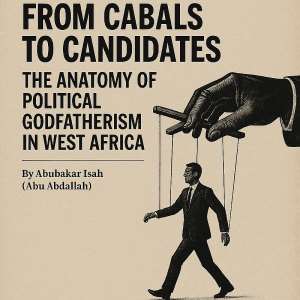
In West Africa’s political landscape, elections often appear to be contests of ideas and popularity. But beneath the surface of grand rallies and polished manifestos lies a more entrenched force: political godfatherism. It’s an open secret in the region one that quietly shapes political outcomes while undermining democracy itself. From Nigeria to Senegal, Ghana to Guinea, power often rests not with the people but with influential figures pulling strings behind the scenes.
The Making of a Godfather
Political godfatherism doesn’t spring up by chance. It grows in the cracks of weak institutions, thrives on economic inequality, and is sustained by cultural norms that place loyalty above integrity. A political godfather is usually a wealthy former officeholder, business magnate, or community leader who sponsors a candidate’s rise to power. In exchange, they expect loyalty and access to state resources. In essence, governance becomes a transaction: the godfather delivers power; the protégé delivers compliance.
Nigeria provides some of the clearest examples. The legacy of the late Lamidi Adedibu in Oyo politics or the enduring influence of Bola Tinubu in Lagos are testaments to the strength of godfatherism. In Ghana, party elders often wield disproportionate influence in selecting candidates, while in Senegal, transitions of power have occasionally reflected the wishes of past presidents more than the will of the people.
A Democratic Contradiction
At its core, godfatherism contradicts the very foundation of democracy. Elections are supposed to empower citizens to choose leaders based on merit, integrity, and vision. But when candidates are handpicked in secret before any vote is cast, the process becomes hollow. Leaders emerge not from the ballot box but from the backroom. They answer not to the public, but to their political patrons.
This undermines public trust and discourages innovation in governance. Young or reform-minded aspirants without a powerful sponsor often struggle to gain traction, no matter their qualifications. Instead, loyalists and insiders are ushered into office. Competence takes a back seat to allegiance with devastating effects on development and public service delivery.
The Godson’s Dilemma
Of course, not all godsons remain loyal. Sometimes, protégés challenge their patrons, leading to dramatic fallouts. These rifts can result in political crises ranging from defections and impeachments to the collapse of party structures. In such cases, power struggles overshadow governance, and the electorate is left to bear the consequences.
Culture and Corruption: The Enablers
Cultural expectations around respect for elders and benefactors often reinforce godfatherism. While these values are rooted in tradition, they can be misused in politics to discourage dissent and enforce silence.
Corruption, too, plays a critical role. Political godfathers rarely act out of pure altruism. Their support is an investment, with expectations of returns in the form of contracts, appointments, or protection. State resources are treated as spoils to be shared, not assets to be protected eroding transparency and weakening public institutions.
Breaking the Chains
Challenging political godfatherism requires real reform. Electoral bodies must be truly independent, with the power to enforce internal democracy within political parties. Primaries should be open and transparent, giving voice to party members rather than a select few.
The judiciary must also play its part by courageously addressing election malpractice, regardless of who is involved. And perhaps most importantly, the public must be informed and engaged. A politically aware and active population is the strongest antidote to elite manipulation.
Civil society, investigative media, and youth movements have already begun pushing back using digital tools to expose backroom deals and promote credible alternatives. These efforts must be strengthened and sustained.
Toward a People’s Democracy
The tale of political godfatherism in West Africa is one of power concentrated in too few hands. But it’s also a call to action. If democracy is to thrive, it must be reclaimed from cabals and returned to the people. Only then can leaders rise on the strength of their ideas not the strings of a puppet master.


